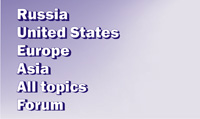


Articles
National flag of Russian Federation hoisted on Yakutia nuclear icebreaker
Reactor pressure vessel of Xudapu NPP Unit 4 has been installed in design position
China offers the world a solution through nuclear technology applications
Alexey Likhachev attended the launching ceremony of Chukotka nuclear icebreaker
Rosatom manufactures first nuclear fuel for a research reactor in Bolivia
Press Releases
34th Rossing Marathon held in Namibian Swakopmund
Rosatom to Co-host The Arctic - A Territory of Dialogue International Arctic Forum

Russia to set up radioactive materials control body
Russia's top nuclear official said Tuesday that the National Anti-Terrorism Committee would establish a central authority to control the movement of all radioactive materials.
The agency's press secretary, Sergei Novikov, said currently over 10 departments in Russia deal with radioactive materials, including the health and transportation ministries, the education ministry, and the hydrometeorology service.
"We have many bodies overseeing the transportation of fissile materials, including harmless ones such as radioactive medical products, which can nevertheless be used for terrorist purposes," Sergei Kiriyenko, the head of the Federal Nuclear Power Agency, said after a regular session of the committee.
Kiriyenko also said: "The most important factor in countering the nuclear terrorism threat is having the strictest possible controls over movements of all fissile materials," he said.
The Russian nuclear chief said that information terrorism was also a threat, citing recent rumors spread about an alleged nuclear accident at the Volgodonsk power plant in southern Russia in late May.
"This innocent joke caused panic in several regions across Russia. And I have a clear understanding that this was not by chance or mistake but that it was a well planned action," he said, adding that "When people receive calls of reports about false explosions, suggesting that they contact friends and acquaintances...we need to be ready."
A deputy secretary of Russia's Security Council said Tuesday the antiterrorism committee would set up a group to counter terrorist ideology.
Valentin Sobolev said the group would monitor developments in troubled Russian regions, and coordinate operations with the media, organizations, and commerce. He also urged a complex solution to the problem of overcoming terrorist ideology, saying that "it's clear the National Anti-Terrorism Committee and FSB cannot fight this ideology."
Federal Security Service Director Nikolai Patrushev said earlier at the antiterrorism committee session that nationalism, separatism, religious and political extremism were at the core of terrorist ideology, adding that these phenomena usually appear where there are "serious interethnic, territorial, and social-economic problems."
Russia has seen a surge in ultra-nationalism in recent years, with routine attacks by gangs on foreigners and people with non-Slavic features. But authorities have been generally reluctant to treat the attacks as race-hate crimes, portraying them instead as acts of hooliganism.
SOURCE: RIA Novosti
DATE: June 06, 2007